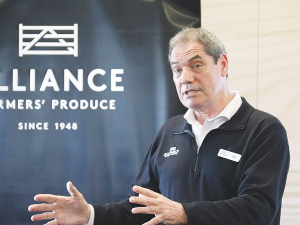Meat processor Alliance Group's cash-strapped farmer shareholders face a dilemma - either pour more money into the co-operative or risk losing 100% ownership and control.
Alliance needs more capital to strengthen its balance sheet, lift efficiency and pursue additional 'value capture' opportunities. However, weak lamb prices mean many sheep farmers are struggling to make ends meet, so forking out extra capital for the co-op will be a tough ask.
Farmer shareholders will hear Alliance's plans in the coming weeks.
Chief executive Willie Wiese says ultimately the future of Alliance Group as a co-operative depends on how shareholders respond to their capital raise.
"If farmers wish Alliance to stay a 100% farmer-owned co-operative, the only way that can happen is if shareholders contribute," Wiese told Rural News.
"We will be talking to farmers about the capital raise over the coming weeks. It is too early to speculate on other options until we have completed this process."
Federated Farmers meat and wool section chair Toby Williams says Alliance's call for more shareholders capital is tantamount to asking farmers to take bread off their own tables to keep the company afloat.
He says not many Alliance shareholders would be able to pump more capital into the company.
"Right now, it's hard for farmers and it's hard for Alliance," Williams told Rural News.
"For farmers, it's a tough situation, making sure we are paid, and our workers are paid. Alliance is asking farmers to take bread off their own tables to keep the company afloat."
Williams believes it is highly unlikely that Alliance will be forced to sell a stake to an outside investor as was the case with rival meat processor Silver Fern Farms.
"There's always a possibility but it's highly likely; for the investor market, buying a share in Alliance is not a palatable affair right now."
For the year ending September 2023, Alliance Group posted a pre-tax loss of $98 million, a dramatic reversal from the previous year's record $116m profit. Alliance blamed significant volatility due to geo-political tensions, labour constraints, inflationary pressures and weakening global markets for the shock result.
Wiese says farmers are of course disappointed and that's understandable.
"Times are tough on farm, so this is certainly not an ideal time to ask farmers for capital. A number of farmers I have spoken with appreciate the challenging situation we are in. They accept we are exploring all other viable opportunities to reduce working capital and they support Alliance remaining a co-operative."
Alliance's new chair Mark Wynne points out that New Zealand's red meat sector has been impacted by weaker global market prices.
"Farmers, processing companies and the agribusiness industry in general are facing significant financial pressure. Alliance Group is no exception.
"Our current trading position and forecast indicates we will make a modest profit this fiscal year, which will be a significant turnaround from our loss last year. This is in line with our financial performance over the last decade where Alliance has been profitable for nine of the last 10 years.
"Over the last 12 months, in particular, we have had a relentless focus on cost reduction, optimising market pricing and inventory in order to reduce our working capital requirements. We've made good progress on all fronts.
"However, a signalled at the co-operative's annual meeting last year, we do need to raise capital from our farmer-shareholders," Wynne says.



















